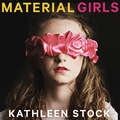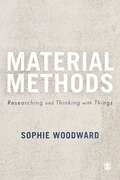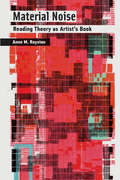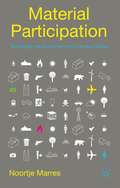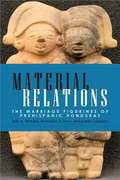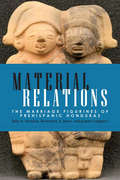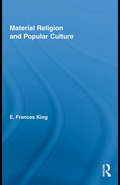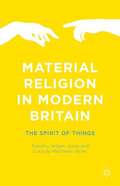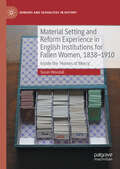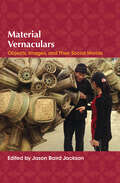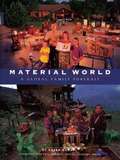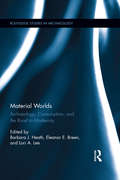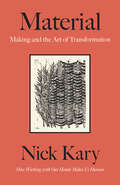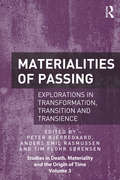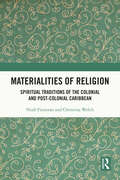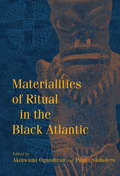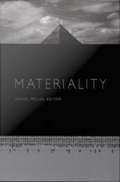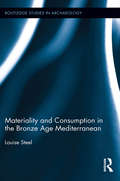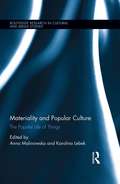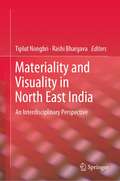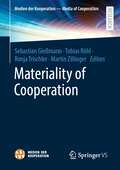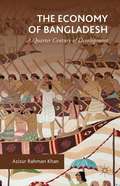- Table View
- List View
Material Girls: Why Reality Matters for Feminism
by Kathleen Stock'A clear, concise, easy-to-read account of the issues between sex, gender and feminism . . . an important book' Evening Standard 'A call for cool heads at a time of great heat and a vital reminder that revolutions don't always end well' Sunday Times Material Girls is a timely and trenchant critique of the influential theory that we all have an inner feeling known as a gender identity, and that this feeling is more socially significant than our biological sex.Professor Kathleen Stock surveys the philosophical ideas that led to this point, and closely interrogates each one, from De Beauvoir's statement that, 'One is not born, but rather becomes a woman' (an assertion she contends has been misinterpreted and repurposed), to Judith Butler's claim that language creates biological reality, rather than describing it. She looks at biological sex in a range of important contexts, including women-only spaces and resources, healthcare, epidemiology, political organization and data collection.Material Girls makes a clear, humane and feminist case for our retaining the ability to discuss reality, and concludes with a positive vision for the future, in which trans rights activists and feminists can collaborate to achieve some of their political aims.
Material Methods: Researching and Thinking with Things
by Sophie WoodwardMaterial Methods brings together resources for researchers investigating both the material, as well as the social world through material objects we design, buy, make, exchange and collect. It covers the whole research process, from theoretical underpinnings, selection of methods and their possible uses, as well as representing and analysing data. It introduces students and researchers to the wide range of cross-disciplinary methods which help us to approach and interpret material culture and materials. The book also provides students and researchers with the tools to critically reflect upon pre-existing methods to see their limitations as well as possibilities, and apply them to their own research practice.
Material Methods: Researching and Thinking with Things
by Sophie WoodwardMaterial Methods brings together resources for researchers investigating both the material, as well as the social world through material objects we design, buy, make, exchange and collect. It covers the whole research process, from theoretical underpinnings, selection of methods and their possible uses, as well as representing and analysing data. It introduces students and researchers to the wide range of cross-disciplinary methods which help us to approach and interpret material culture and materials. The book also provides students and researchers with the tools to critically reflect upon pre-existing methods to see their limitations as well as possibilities, and apply them to their own research practice.
Material Noise: Reading Theory as Artist's Book
by Anne M. RoystonAn argument that theoretical works can signify through their materiality—their “noise,” or such nonsemantic elements as typography—as well as their semantic content. In Material Noise, Anne Royston argues that theoretical works signify through their materiality—such nonsemantic elements as typography or color—as well as their semantic content. Examining works by Jacques Derrida, Avital Ronell, Georges Bataille, and other well-known theorists, Royston considers their materiality and design—which she terms “noise”—as integral to their meaning. In other words, she reads these theoretical works as complex assemblages, just as she would read an artist's book in all its idiosyncratic tangibility. Royston explores the formlessness and heterogeneity of the Encyclopedia Da Costa, which published works by Bataille, André Breton, and others; the use of layout and white space in Derrida's Glas; the typographic illegibility—“static and interference”—in Ronell's The Telephone Book; and the enticing surfaces of Mark C. Taylor's Hiding, its digital counterpart The Réal: Las Vegas, NV, and Shelley Jackson's Skin. Royston then extends her analysis to other genres, examining two recent artists' books that express explicit theoretical concerns: Johanna Drucker's Stochastic Poetics and Susan Howe's Tom Tit Tot.Throughout, Royston develops the concept of artistic arguments, which employ signification that exceeds the semantics of a printed text and are not reducible to a series of linear logical propositions. Artistic arguments foreground their materiality and reflect on the media that create them. Moreover, Royston argues, each artistic argument anticipates some aspect of digital thinking, speaking directly to such contemporary concerns as hypertext, communication theory, networks, and digital distribution.
Material Participation
by Noortje MarresThis book develops a fresh perspective on everyday forms of engagement, one that foregrounds the role of objects, technologies and settings in democracy. Examining a range of devices, from smart meters to eco-homes, the book sets out new concepts and methods for analyzing the relations between participation, innovation and the environment.
Material Powers: Cultural Studies, History and the Material Turn (CRESC)
by Tony Bennett Patrick JoyceThis edited collection is a major contribution to the current development of a ‘material turn’ in the social sciences and humanities. It does so by exploring new understandings of how power is made up and exercised by examining the role of material infrastructures in the organization of state power and the role of material cultural practices in the organization of colonial forms of governance. A diverse range of historical examples is drawn on in illustrating these concerns – from the role of territorial engineering projects in seventeenth-century France through the development of the postal system in nineteenth-century Britain to the relations between the state and road-building in contemporary Peru, for example. The colonial contexts examined are similarly varied, ranging from the role of photographic practices in the constitution of colonial power in India and the measurement of the bodies of the colonized in French colonial practices to the part played by the relations between museums and expeditions in the organization of Australian forms of colonial rule. These specific concerns are connected to major critical re-examination of the limits of the earlier formulations of cultural materialism and the logic of the ‘cultural turn’. The collection brings together a group of key international scholars whose work has played a leading role in debates in and across the fields of history, visual culture studies, anthropology, geography, cultural studies, museum studies, and literary studies.
Material Relations
by Julia A. Hendon Rosemary A. Joyce Jeanne LopiparoFocusing on marriage figurines--double human figurines that represent relations formed through social alliances--Hendon, Joyce, and Lopiparo examine the material relations created in Honduras between AD 500 and 1000, a period of time when a network of social houses linked settlements of a variety of sizes in the region. The authors analyze these small, seemingly insignificant artifacts using the theory of materiality to understand broader social processes. They examine the production, use, and disposal of marriage figurines from six sites--Campo Dos, Cerro Palenque, Copán, Currusté, Tenampua, and Travesia--and explore their role in rituals and ceremonies, as well as in the forming of social bonds and the celebration of relationships among communities. They find evidence of historical traditions reproduced over generations through material media in social relations among individuals, families, and communities, as well as social differences within this network of connected yet independent settlements. Material Relations provides a new and dynamic understanding of how social houses functioned via networks of production and reciprocal exchange of material objects and will be of interest to Mesoamerican archaeologists, anthropologists, and art historians.
Material Relations: The Marriage Figurines of Prehispanic Honduras
by Julia A. Hendon Rosemary A. Joyce Jeanne LopiparoFocusing on marriage figurines—double human figurines that represent relations formed through social alliances—Hendon, Joyce, and Lopiparo examine the material relations created in Honduras between AD 500 and 1000, a period of time when a network of social houses linked settlements of a variety of sizes in the region. The authors analyze these small, seemingly insignificant artifacts using the theory of materiality to understand broader social processes. They examine the production, use, and disposal of marriage figurines from six sites—Campo Dos, Cerro Palenque, Copán, Currusté, Tenampua, and Travesia—and explore their role in rituals and ceremonies, as well as in the forming of social bonds and the celebration of relationships among communities. They find evidence of historical traditions reproduced over generations through material media in social relations among individuals, families, and communities, as well as social differences within this network of connected yet independent settlements. Material Relations provides a new and dynamic understanding of how social houses functioned via networks of production and reciprocal exchange of material objects and will be of interest to Mesoamerican archaeologists, anthropologists, and art historians.
Material Religion and Popular Culture (Routledge Studies in Religion)
by E. Frances KingIn this study, E. Frances King explores how people first learn to relate to the images and artefacts of religious belief within their domestic environments. As a sense of religious belonging is instilled on a daily basis in the home, it also becomes emotionally linked to family, community, and homeland, resulting in two different genealogies – one to do with faith and one to do with motherland – that become entangled.
Material Religion in Modern Britain
by Timothy Willem Jones Lucinda Matthews-JonesA growing awareness of religious plurality and religious conflict in contemporary society has led to a search for new ways to understand religious change beyond traditional subjects of British ecclesiology. Narratives of the gradual decline of Christianity dominate this field; yet many scholars now concede that Britain's religious landscape was more varied and rich than these narratives would suggest. Material Religion in Modern Britain responds to this challenge by bringing emerging scholarship on material culture to bear on studies of religion and spirituality. The collection is the first to apply this suite of analytical methods to the traditional subjects of British religious studies and the full spectrum of religious denominations, sects, and movements that constituted Britain's multi-faith landscape in the nineteenth and twentieth centuries. The book reveals how, across this religious spectrum, objects were, and continue to be, used in the performance and production of religious faith and subjectivity. In doing so it expands our understanding of the persistence of religious belief and culture in a secularising, secularized, and post-secular society.
Material Setting and Reform Experience in English Institutions for Fallen Women, 1838-1910: Inside the ‘Homes of Mercy’ (Genders and Sexualities in History)
by Susan WoodallTracing the history of four English case studies, this book explores how, from outward appearance to interior furnishings, the material worlds of reform institutions for ‘fallen’ women reflected their moral purpose and shaped the lived experience of their inmates. Variously known as asylums, refuges, magdalens, penitentiaries, Houses or Homes of Mercy, the goal of such institutions was the moral ‘rehabilitation’ of unmarried but sexually experienced ‘fallen’ women. Largely from the working-classes, such women – some of whom had been sex workers – were represented in contradictory terms. Morally tainted and a potential threat to respectable family life, they were also worthy of pity and in need of ‘saving’ from further sin. Fuelled by rising prostitution rates, from the early decades of the nineteenth century the number of moral reform institutions for ‘fallen’ women expanded across Britain and Ireland. Through a programme of laundry, sewing work and regular religious instruction, the period of institutionalisation and moral re-education of around two years was designed to bring about a change in behaviour, readying inmates for economic self-sufficiency and re-entry into society in respectable domestic service. To achieve their goal, institutional authorities deployed an array of ritual, material, religious and disciplinary tools, with mixed results.
Material Vernaculars: Objects, Images, and Their Social Worlds (Material Vernaculars Ser.)
by Jason Baird JacksonThe role of objects and images in everyday life are illuminated incisively in Material Vernaculars, which combines historical, ethnographic, and object-based methods across a diverse range of material and visual cultural forms. The contributors to this volume offer revealing insights into the significance of such practices as scrapbooking, folk art produced by the elderly, the wedding coat in Osage ceremonial exchanges, temporary huts built during the Jewish festival of Sukkot, and Kiowa women's traditional roles in raiding and warfare. While emphasizing local vernacular culture, the contributors point to the ways that culture is put to social ends within larger social networks and within the stream of history. While attending to the material world, these case studies explicate the manner in which the tangible and intangible, the material and the meaningful, are constantly entwined and co-constituted.
Material World: A Global Family Portrait
by Charles C. Mann Peter MenzelWe are witnessing the emergence of a unified world economy, as exemplified by NAFTA and GATT, that will, in theory, make goods available at cheaper prices, and create new jobs throughout the world.
Material Worlds: Archaeology, Consumption, and the Road to Modernity (Routledge Studies in Archaeology)
by Barbara J. Heath Eleanor E. Breen Lori A. LeeMaterial Worlds examines consumption from an archaeological perspective, broadly exploring the intersection of social relations and objects through the processes of production, distribution, use, reuse, and discard. Interrogating individual objects as well as considering the contexts in which acts of consumption take place, a range of case studies present the intertwined issues of power, inequality, identity, and community as mediated through choice, access, and use of the diversity of mass-produced goods. Key themes of this innovative volume include the relationship between colonial, political and economic structures and the practices of consumption, the use of consumer goods in the construction and negotiation of identity, and the dialectic between strategies of consumption and individual or community choices. Situating studies of consumerism within the field of historical archaeology, this exciting collection reflects on the interrelationship between the material and ideological aspects of culture. With a focus on North America from the seventeenth through the early twentieth centuries, Material Worlds is an important examination of consumption which will appeal to scholars with interests in colonialism, gender and race, as well as those engaged with the material culture of the emergent modern world.
Material: Making and the Art of Transformation
by Nick KaryA master craftsperson explores the ways in which working with our hands reveals the essence of both our humanity and our relationship with the natural, material world In our present age of computer-assisted design, mass production and machine precision, the traditional skills of the maker or craftsperson are hard to find. Yet the desire for well-made and beautiful objects from the hands (and mind) of a skilled artisan is just as present today as it ever has been. Whether the medium they work with is wood, metal, clay or something else, traditional makers are living links to the rich vein of knowledge and skills that defines our common human heritage. More than this, though, many of us harbor a deep and secret yearning to produce something – to build or shape, to imagine and create our own objects that are imbued not only with beauty and functionality, but with a story and, in essence, a spirit drawn from us. Nick Kary understands this yearning. For nearly four decades he has worked on commission to make fine, distinctive furniture and cabinets from wood, most of it sourced near his home, in the counties of South West England. During this time, he has been both a teacher and a student; one who is fascinated with the philosophy and practice of craft work of all kinds. In Material, Kary takes readers along with him to visit some of the places where modern artisans are preserving, and in some cases passing on, the old craft skills. His vivid descriptions and eye for detail make this book a rich and delightful read, and the natural and cultural history he imparts along the way provides an important context for understanding our own past and the roots of our industrial society. Personal, engaging, and filled with memorable people, landscapes and scenes, Material is a rich celebration of what it means to imagine and create, which in the end is the essence of being human, and native to a place. As Kary puts it, “Wood and words, trees and people, material and ethereal – it is here I love increasingly to dwell.”
Materialien zur Kriminalsoziologie (René König Schriften. Ausgabe letzter Hand #13)
by René KönigDer Band versammelt die thematisch weit gestreuten und höchst vielgestaltigen Schriften von René König zu Fragen der Kriminalsoziologie, der sozialen Kontrolle und des abweichenden Verhaltens. Damit liegt erstmals eine Übersicht seines diesbezüglichen Werkes vor, das zeitlich von den Jahren seiner Zürcher Emigration bis in die 1980er Jahre reicht und die Fülle seiner Aufsätze, Vorträge, Lexikonbeiträge, Rezensionen und vereinzelt auch Veröffentlichungen in der Tagespresse zu einem in sich geschlossenen Materialienband zusammenfasst.
Materialities of Passing: Explorations in Transformation, Transition and Transience (Studies in Death, Materiality and the Origin of Time)
by Peter Bjerregaard Anders Emil Rasmussen Tim Flohr Sørensen‘Passing’ is a common euphemism for the death of a person, as he or she is said to ‘pass away’ or ‘pass on’. This open-ended saying has at its heart a notion of transformation from one state to another, which in turn grants the possibility of grasping or approximating the passage of time and the materiality of death and decay. This book begins with the idea that since all material things - whether animals, human beings, objects or buildings - undergo some form of passing, then the specific transformation in these passages and the materiality actively given to it can offer us a grasp of otherwise precarious temporalities. It examines how human beings strive to relate to the temporal dimension of death and decay, by giving new shape and direction to being and by examining its natural transformations. Focusing on the materiality of passing, and thereby the relationship between embodiment, temporality and death, Materialities of Passing offers rich case studies from Europe, Papua New Guinea, South Africa and the Russian Far East for exploring the material, spatial and directional aspects of the very interface between life and death. As such, it will appeal to scholars of anthropology, death studies, archaeology, philosophy and cultural studies.
Materialities of Religion: Spiritual Traditions of the colonial and post-colonial Caribbean
by Niall Finneran Christina WelchThis book offers an overview of the material expressions of Caribbean religious expressions, including those that have been imported through the vehicle of colonialism, and which subsequently changed and adapted within the Caribbean Islands and those religious expressions which developed through the contact of African, indigenous and imported world views. This book takes a multi-disciplinary perspective, drawing from subjects as diverse as archaeology, religious studies, history, human geography and anthropology. It introduces current topical debates around the role of colonialism and religion in the Caribbean, and also considers theoretical approaches to the study of Caribbean religions set within a wider global context. This approach introduces the reader to a number of important and topical concepts around the wider study of Caribbean religions, and illuminates the complex cultural history and interplay of these religions in the Caribbean Islands. Richly illustrated and drawing upon a range of different cultural approaches, it offers new and challenging perspectives on the development and cultural history of Caribbean spiritual and religious expression through the lens of the material world. The book is for anyone interested in the Caribbean as a region and the role of religious behaviour in human society. Students of religions, archaeology and anthropology will find a number of thought-provoking and important case studies which relate complex theories to real-world case studies. Any profits from this book will be donated to UNICEF Eastern Caribbean projects supporting vulnerable children in the region (https://www.unicef.org/easterncaribbean/).
Materialities of Ritual in the Black Atlantic
by Akinwumi Ogundiran Paula SaundersFocusing on everyday rituals, the essays in this volume look at spheres of social action and the places throughout the Atlantic world where African-descended communities have expressed their values, ideas, beliefs, and spirituality in material terms. The contributors trace the impact of encounters with the Atlantic world on African cultural formation, how entanglement with commerce, commodification, and enslavement and with colonialism, emancipation, and self-rule manifested itself in the shaping of ritual acts such as those associated with birth, death, healing, and protection. Taken as a whole, the book offers new perspectives on what the materials of rituals can tell us about the intimate processes of cultural transformation and the dynamics of the human condition.
Materiality
by Daniel MillerThroughout history and across social and cultural contexts, most systems of belief--whether religious or secular--have ascribed wisdom to those who see reality as that which transcends the merely material. Yet, as the studies collected here show, the immaterial is not easily separated from the material. Humans are defined, to an extraordinary degree, by their expressions of immaterial ideals through material forms. The essays in Materiality explore varied manifestations of materiality from ancient times to the present. In assessing the fundamental role of materiality in shaping humanity, they signal the need to decenter the social within social anthropology in order to make room for the material. Considering topics as diverse as theology, technology, finance, and art, the contributors--most of whom are anthropologists--examine the many different ways in which materiality has been understood and the consequences of these differences. Their case studies show that the latest forms of financial trading instruments can be compared with the oldest ideals of ancient Egypt, that the promise of software can be compared with an age-old desire for an unmediated relationship to divinity. Whether focusing on the theology of Islamic banking, Australian Aboriginal art, derivatives trading in Japan, or textiles that respond directly to their environment, each essay adds depth and nuance to the project that Materiality advances: a profound acknowledgment and rethinking of one of the basic properties of being human. Contributors. Matthew Engelke, Webb Keane, Susanne Kchler, Bill Maurer, Lynn Meskell, Daniel Miller, Hirokazu Miyazaki, Fred Myers, Christopher Pinney, Michael Rowlands, Nigel Thrift
Materiality and Consumption in the Bronze Age Mediterranean: Materiality And Consumption In The Bronze Age Mediterranean (Routledge Studies in Archaeology #7)
by Louise SteelThe importance of cultural contacts in the East Mediterranean has long been recognized and is the focus of ongoing international research. Fieldwork in the Aegean, Egypt, Cyprus, and the Levant continues to add to our understanding of the nature of this contact and its social and economic significance, particularly to the cultures of the Aegean. Despite sophisticated discussion of the archaeological evidence, in particular on the part of Aegean and Mediterranean archaeologists, there has been little systematic attempt to incorporate anthropological perspectives on materiality and exchange into archaeological narratives of this material. This book addresses that gap and integrates anthropological discourse on contact, examining exchange systems, the gift, notions of geographical distance and power, colonization, and hybridization. Furthermore, it develops a social narrative of culture contact in the Mediterranean context, illustrating the reasons communities chose to engage in international exchange, and how this impacted the construction of identities throughout the region. While traditional archaeologies in the East Mediterranean have tended to be reductive in their approach to material culture and how it was produced, used, and exchanged, this book reviews current research on material culture, focusing on issues such as the biography of objects, inalienable possessions, and hybridization – exploring how these issues can further illuminate the material world of the communities of the Bronze Age Mediterranean.
Materiality and Popular Culture: The Popular Life of Things (Routledge Research in Cultural and Media Studies)
by Anna Malinowska Karolina LebekThis book critically approaches contemporary meanings of materiality and discuses ways in which we understand, experience, and engage with objects through popular culture in our private, social and professional lives. Appropriating Arjun Appadurai’s famous phrase: "the social life of things", with which he inspired scholars to take material culture more seriously and, as a result, treat it as an important and revealing area of cultural studies, the book explores the relationship between material culture and popular practices, and points to the impact they have exerted on our co-existence with material worlds in the conditions of late modernity.
Materiality and Visuality in North East India: An Interdisciplinary Perspective
by Rashi Bhargava Tiplut NongbriThis edited book set in the context of North East India explores issues concerning symbols, meanings, representations, and social implications of materiality and visuality, as well as the dynamics of power, social reproduction, ideological dominance and knowledge production, from an interdisciplinary perspective. It seeks to answer the question of why some things matter more than others or what happens when certain things are made more visible than others. The book provides valuable insights into the process of identity construction through the use of cultural sources, both material and visual. Following on the debates/discussions on material and visual culture in the 1970s and 1980s, the book argues that instead of viewing objects as mere representation(s), one should see them as active agents in creating perceptions, bodily practices, discourses and perceptions of our social world. Each chapter in the book unravels and engages with these pertinent issues in order to arrive at a more comprehensive understanding of the status quo. The book is of interest to scholars of ethnicity, identity construction, politics and state, cultural studies, media studies, visual, social and cultural anthropology and sociology, as well as lay readers who want to learn more about the region.
Materiality of Cooperation (Medien der Kooperation – Media of Cooperation)
by Martin Zillinger Tobias Röhl Sebastian Gießmann Ronja TrischlerThe volume investigates the socio-material dimension and media practices of cooperation – before, during and beyond situations. Cooperation is understood as reciprocal interplay operating with or without consensus, in co-presence or absence of the involved actors in distributed situations. Artefacts, bodies, texts and infrastructures are the media that make cooperation possible. They enable and configure reciprocal accomplishments – and are themselves created through media practices in cooperative situations.
Materiality, Rules and Regulation: New Trends in Management and Organization Studies (Technology, Work and Globalization)
by Nathalie Mitev François-Xavier de Vaujany Anouk Mukherjee Giovan LanzaraMateriality, Rules and Regulation: New Trend in Management and Organization Studies concentrates on the relationship of rules and regulation to the materiality of artefacts, practices, and organizations. It combines the recent scholarly interest on sociomateriality with a focus on regulation and rules.
